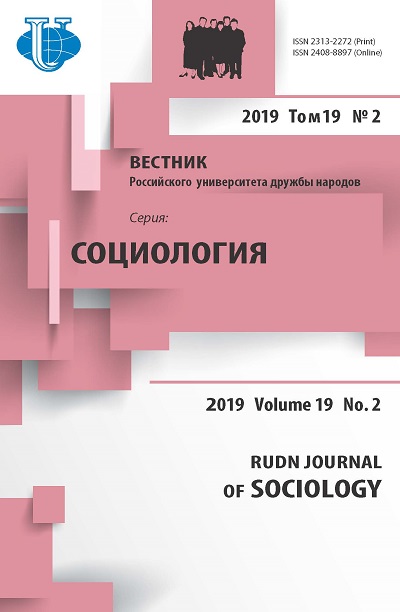Possibilities of solving social problems of African countries by means of public-private partnership
- Authors: Pashkova EV1, Morozenskaya EV2, Tambo T.H.1, Kalinichenko LN2
-
Affiliations:
- RUDN University (Peoples’ Friendship University of Russia)
- Institute for African Studies of the Russian Academy of Sciences
- Issue: Vol 19, No 2 (2019)
- Pages: 244-260
- Section: Contemporary society: the urgent issues and prospects for development
- URL: https://journals.rudn.ru/sociology/article/view/21098
- DOI: https://doi.org/10.22363/2313-2272-2019-19-2-244-260
Cite item
Full Text
Abstract
The article considers the possibilities of the public-private partnership (PPP) in solving social-economic problems of African countries. The authors analyze the features and perspectives of the PPP mechanism in Africa for solving urgent social problems primarily in the sphere of public services. PPP means state-business cooperation in the spheres that are important for the population’s living standards and has large potential for the social development. Some African counties has already recognized the high efficiency of PPP and use this method for solving such problems as lack of social infrastructure and social development, low quality of the public utilities and poverty. The authors argue that the main sphere of implementing the PPP projects in Africa is the sector of information and telecommunication (IT). The majority of PPP infrastructure projects are implemented in the power economy (especially in Morocco and Egypt). Today, the African governments expand the PPP projects to the power networks development and construction, and to the renewable energy sources exploitation. The article provides some recent examples of the PPP projects in different spheres such as the development of social infrastructure in Africa, including education, public health and maintenance of public order. Due to the global trend of the infrastructure services digitalization and extension of information accessibility, African states take steps for the creation of electronic information portals for the PPP-projects (for example, in Nigeria and Ghana - with the World Bank assistance). Moreover, there are all-regional programs introduced to support initiative projects with the electronic platforms.
About the authors
E V Pashkova
RUDN University (Peoples’ Friendship University of Russia)
Author for correspondence.
Email: lena_pashkova@mail.ru
-
Miklukho-Maklaya St., 6, Moscow, Russia, 117198E V Morozenskaya
Institute for African Studies of the Russian Academy of Sciences
Email: evmorozen@mail.ru
-
Spiridonovka St., 30/1, Moscow, Russia, 123001Talla Herve Tambo
RUDN University (Peoples’ Friendship University of Russia)
Email: tamboherve@yahoo.fr
-
Miklukho-Maklaya St., 6, Moscow, Russia, 117198L N Kalinichenko
Institute for African Studies of the Russian Academy of Sciences
Email: kalinichenkolyudmila@mail.ru
-
Spiridonovka St., 30/1, Moscow, Russia, 123001References
- Afrika: sovremennie strategii ekonomicheskogo razvitiya [Africa: Modern Strategies of Economic Development]. Мoscow; 2016 (In Russ.).
- Varnavsky V.G. Gosudarstvenno-chastnoe partnerstvo i byudjetny protsess v Rossii [Public-private partnership and budgetary process in Russia]. Mezhdunarodnaya nauchno-prakticheskaya konferentsiya “Sovremenny megapolis: uspekhi i problemy GChP v Rossii i Germanii”. Moscow; 2015 (In Russ.).
- Doklad o chelovecheskom razvitii 2011. Ustoychivoe razvitie i ravenstvo vozmozhnostey: luchshee budushchee dlya vsekh [Human Development Report 2011. Sustainability and Equity: A Better Future for All]. New York; 2012 (In Russ.).
- Ivanova V.N., Ivanov V.S. Gosudarstvenno-chastnoe partnerstvo v innovatsionnom razvitii regiona i predpriyaty [Public-private partnership in the innovative development of the region and enterprises]. Moscow; 2014 (In Russ.).
- Kalinichenko L.N. Novie strategii razvitiya energeticheskogo sektora v stranah Afriki yujnee Sahary [New strategies for energy sector development in Sub-Saharan Africa]. Afrika: sovremennie strategii ekonomicheskogo razvitiya. Мoscow; 2016 (In Russ.).
- Kalinichenko L.N. Problemy razvitiya energetiki Gany [Problems of Ghana’s energy development]. Gana: 60 let nezavisimosti. Moscow; 2017 (In Russ.).
- Matveeva N. Sotovaya svyaz v Afrike: keniysky variant [Mobile connection in Africa: The Case of Kenya]. Asia and Africa Today. 2014; 1 (In Russ.).
- Morozenskaya E., Matsenko I. Vozmojnosti ekonomicheskogo razvitiya Afriki v usloviyah novoy promyshlennoy revolutsii i perspektivy mobilnogo bankinga [African economies under the new industrial revolution and the mobile banking prospects]. Vestnik Akademii. 2018; 1 (In Russ.).
- Novikova Z.S. Mobilnie technologii v stranah Vostochnoy Afriki - novie vozmojnosti dlya ekonomicheskogo rosta [Mobile technologies in East African countries - new possibilities for the economic growth]. Journal of the Institute for African Studies. 2018; 2 (In Russ.).
- Pashkova E.V., Tambo T.R.H. Gosudarstvenno-chastnoe partnerstvo v afrikanskih stranah: tseli i usloviya razvitiya, factory ustoychivosti i osnovnie harakterictiki [Public-private partnership in African countries: Goals and conditions of development, factors of sustainability and basic characteristics]. RUDN Journal of Economics. 2016; 1 (In Russ.).
- Pashkova E.V., Tambo T.R.H. Gosudarstvenno-chastnoe partnerstvo i strategii socialno-ekonomicheskogo razvitiya afrikanskih stran [Public-private partnership and strategies of the social-economic development of African countries]. Afrika: sovremenniye strategii ekonomicheskogo razvitiya. Мoscow; 2016 (In Russ.).
- Rekomendatsii po realizatsii proektov GChP v sub’ektah Rossiyskoy Federatsii [Recommendations for the Realization of the PPP-projects in the Regions of the Russian Federation]. http://pppcenter.ru/assets/files/presentations/GChP-Recommend_web.pdf (In Russ.).
- Mbiti I., Weil D.N. Mobile Banking: The Impact of M-Pesa in Kenya. National Bureau of Economic Research. Working Paper 17129, June 2011.
- Scaling-Up Renewable Energy Program. Ethiopia Investment Plan. Ministry of Water and Energy. January, 2012.
- Aker J.C. Information from markets near and far: Mobile phones and agricultural markets in Niger. American Economic Journal: Applied Economics. 2010: 2 (3).
- All Africa-2017. Mobile subscriptions hit 1 billion soon. http://allafrica.com/stories/ 201704110831.html.
- GSMA: The mobile economy Sub-Saharan Africa. 2017. https://www.gsmaintelligence.com/ research/?file=7bf3592e6d750144e58d9dcfac6adfab&download.
- IFC Advisory Services in Public-Private Partnerships. https://www.ifc.org/wps/wcm/connect/ 5668b20040c913338d3b9d5d948a4a50/PPPStories_Nigeria_CrossRiverHospital.pdf?Mod= ajperes.
- Internet World Stats, 2017. https://www.internetworldstats.com/stats1.htm.
- Kenyan Central Bank 2017: Mobile Payments. https://www.centralbank.go.ke/national-payments-system/mobile-payments.
- Linking up: Public-Private Partnerships in Power Transmission in Africa. http://www.worldbank.org/en/topic/energy/publication/linking-up.
- Scott M.C. Private prison REITs released hearonearth. 2017. https://hearonearth.wordpress.com/ tag/mangaung-maximum-security-private-prison.
- Statista: Number of internet users in selected countries in Africa as of June 2017. https://www.statista.com/statistics/505883/number-of-internet-users-in-african-countries.
- International Data Corporation (IDC) - Smartphone sales slow in Africa while feature phones remain resilient. 2017. https://www.idc.com/getdoc.jsp?containerId=prCEMA 42378517&pageType=printfriendly.
- University of Ghana Signs Landmark $64MM USD PPP Investment Contract with Africa Integras. 2015. https://www.ug.edu.gh/news/university-ghana-signs-landmark-64mm-usd-ppp-investment-contract-africa-integras.
- World Bank: Private Participation in Infrastructure Projects Database. http://ppi.worldbank.org.
- Yaici К., Martusewicz-Kulinska J. Sub-Saharan Africa telecoms market: interim forecast update 2016-2021. http://www.analysysmason.com/Research/Content/Regional-forecasts-/SSA-interim-forecast-Mar2017-RDRK0-RDDG0/#08%20March%202017.
- https://www.itu.int/en/ITU-D/Statistics/Pages/stat/default.aspx.














